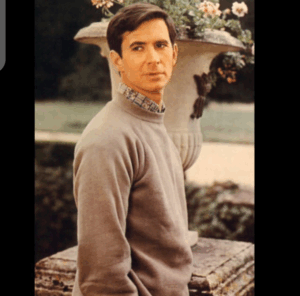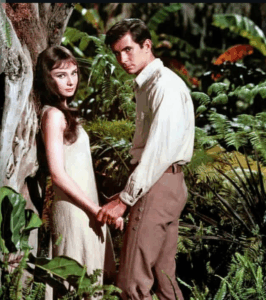Who is Anthony Perkins?
Today lets talk about Anthony Perkins Biography: Anthony Perkins was born on April 4, 1932, in Manhattan, New York City, into a family deeply rooted in the performing arts. He was born to Janet Esselstyn (Rane) and Osgood Perkins, an actor of both stage and film. He was a descendant of a Mayflower passenger, giving him a connection to early American history.
Anthony’s childhood was marked by a profound tragedy that would shape his life and career. His father died when he was just five years old, leaving young Anthony without the guiding presence of his actor father, who had already begun to establish himself in the entertainment industry. This loss deeply affected Perkins and influenced his emotional depth as an actor.
Growing up in New York City, Perkins was exposed to the world of theater and performance from an early age through his father’s connections. Despite the early loss of his father, or perhaps because of it, Anthony developed a strong interest in following in his father’s footsteps and pursuing a career in acting.
Anthony Perkins Biography
Anthony Perkins Education and Early Acting Career
Anthony Perkins began his acting journey as a teenager. He began his acting career as a teenager in summer stock theatre, gaining valuable experience performing in regional theater productions. This early training in summer stock provided him with essential stage experience and helped him develop his craft before transitioning to film.
Perkins briefly attended Rollins College in Florida. At 18 years old, as the son of character actor Osgood Perkins who appeared in the 1932 version of Scarface, he hitchhiked from Rollins College to Hollywood, California to pursue his acting dreams, demonstrating his determination and commitment to the profession at a young age.

Anthony Perkins Broadway Breakthrough and Film Debut
His first film role was in The Actress (1953), marking his entry into cinema. However, it was his Broadway debut that truly launched his career into prominence. He debuted on Broadway in Tea and Sympathy, a performance for which he received critical acclaim. The following year he starred on Broadway as the sensitive adolescent, Tom Lee, in Tea and Sympathy, establishing himself as a talented stage actor capable of portraying complex, sensitive characters.
This Broadway success opened doors for more significant film opportunities and set the stage for what would become a remarkable career in both mediums.
Rise to Stardom: Friendly Persuasion
Perkins’ breakthrough film role came in 1956 with “Friendly Persuasion,” directed by William Wyler. Perkins starred in Friendly Persuasion (1956), which earned him the Golden Globe Award for Best New Actor of the Year and a nomination for the Academy Award for Best Supporting Actor. He earned an Academy Award nomination for his portrayal of a young Quaker in this film, cementing his status as one of Hollywood’s most promising young actors.
This role showcased Perkins’ ability to portray earnest, sensitive young men with depth and authenticity. Perkins specialized in playing awkward young men, a type of character that would become his signature in many of his early film roles.
Anthony Perkins Music Career
During the late 1950s, Perkins briefly pursued a parallel career in music. Perkins released 3 pop music albums and several singles in 1957 and 1958 on Epic and RCA Victor under the name Tony Perkins. While his music career never reached the heights of his acting success, it demonstrated his versatility as an entertainer and his willingness to explore different artistic avenues.
The Defining Role: Norman Bates in Psycho
The role that would forever define Anthony Perkins’ career came in 1960 when he was cast by legendary director Alfred Hitchcock in what would become one of the most influential horror films of all time. Anthony Perkins was best remembered for his portrayal of the murderous motel owner Norman Bates in the Alfred Hitchcock thriller Psycho (1960).
He appeared in what would be his most noted role, Norman Bates in Psycho (1960), memorializing him into film history forever. His performance as the shy, awkward, and ultimately disturbed motel owner became iconic, creating one of cinema’s most memorable villains. Perkins brought a haunting blend of vulnerability, charm, and menace to the character that made Norman Bates both sympathetic and terrifying.
The film was a massive critical and commercial success, and Perkins’ performance became the gold standard for psychological horror. However, this iconic role would also become a double-edged sword, as he found himself typecast in similar roles for much of his subsequent career.
Anthony Perkins Career Through the 1960s and 1970s
Following “Psycho,” Perkins continued to work steadily in film and theater, though he struggled to escape the shadow of Norman Bates. His other film roles include The Trial, Fear Strikes Out, among many others. He appeared in various films throughout the 1960s and 1970s, working with international directors and exploring different genres.
notably in Fear Strikes Out, where he portrayed baseball player Jimmy Piersall, showcasing his ability to portray troubled, complex characters beyond the horror genre. He also worked in European cinema during this period, expanding his range and working with prestigious directors.
Despite his diverse work, the association with Norman Bates remained strong in the public consciousness, and Perkins found it challenging to completely break free from this typecasting.
Anthony Perkins Return to Norman Bates
he reprised this role in three sequels to the original Psycho film. The sequels included “Psycho II” (1983), “Psycho III” (1986), which he also directed, and “Psycho IV: The Beginning” (1990). These films allowed Perkins to revisit and expand upon his most famous character, though none achieved the critical or commercial success of Hitchcock’s original.
In August 1973, Perkins married photographer Berinthia “Berry” Berenson and their son, Oz Perkins, played the role of young Norman Bates in Psycho II, creating a unique father-son collaboration on screen.
Anthony Perkins Personal Life and Marriage
In 1973, Anthony Perkins’ personal life took a significant turn. Berenson met her husband, actor and star of Alfred Hitchcock’s original version of Psycho (1960), Anthony Perkins on the set of his film Play It As It Lays (1972) and married him in 1973. Berinthia “Berry” Berenson-Perkins was an American actress, model and photographer.
The duo had two sons, now actor Osgood, 47, whom they welcomed in February 1974, and now singer-songwriter Elvis, 45, born in February 1976. “He was devoted to them,” adds Winecoff, referring to Perkins’ relationship with his sons. The couple raised 2 sons and remained married until Perkins’ death.
Their son Osgood (Oz) Perkins has become a successful actor and director in his own right, appearing in numerous films and television series. Elvis is a talented singer-songwriter who attended Brown University, pursuing his own artistic path in music.
Perkins’ marriage to Berry Berenson was notable in Hollywood circles, as he had previously been known for relationships with men. The marriage represented a significant chapter in his personal life, and by all accounts, it was a loving and committed relationship that lasted until his death.
Anthony Perkins Later Career and Directorial Work
In the later stages of his career, Perkins continued to work in both film and television. The second half of his career was filled with many supporting character roles that he could happily disappear into. He showed versatility by taking on a variety of character roles that allowed him to showcase different aspects of his talent beyond the psychological thrillers that had defined his earlier work.
Perkins also ventured into directing, helming “Psycho III” in 1986, which demonstrated his understanding of the thriller genre from behind the camera. This move into directing showed his desire to have more creative control over his projects and to expand his role in the filmmaking process.
Anthony Perkins Awards and Recognition
Throughout his career, Anthony Perkins received numerous accolades for his work. Beyond his Oscar nomination for “Friendly Persuasion,” In 1957 he won the Golden Globe award for Most Promising Newcomer in the Male category. He also received various international awards and recognition for his contributions to cinema.
His performance in “Psycho” is widely regarded as one of the greatest in cinema history, though it was not recognized by major award bodies at the time, as horror films were often overlooked by critics and award ceremonies in that era.
Anthony Perkins Illness and Death
After contracting AIDS, Perkins died of pneumonia in September 1992, aged 60. Perkins died in September 1992 from complications of AIDS, a family spokeswoman said at the time in a statement. Anthony Perkins (April 4, 1932 – September 12, 1992) passed away, ending a remarkable four-decade career in entertainment.
Berenson, who married Perkins in 1973, said she has been tested for the HIV virus four times in the past two years and is “fine.” She had two sons with Perkins, ages 18 and 16. Both have tested negative for the virus. His illness had been kept private, and his death came as a shock to many in the entertainment industry and to his fans worldwide.
Anthony Perkins Tragic Aftermath
In a heartbreaking twist of fate, One day before the ninth anniversary of his death, his widow, Berry Berenson, died on American Airlines Flight 11, the flight that was hijacked and crashed into the North Tower of the World Trade Center during the September 11, 2001 attacks by terrorists. She died in the September 11 attacks, as a passenger on American Airlines Flight 11, making the Perkins family story even more tragic.
Also Read: Rajvir Jawanda Biography
Anthony Perkins Legacy and Impact
Anthony Perkins left an indelible mark on cinema history. His portrayal of Norman Bates revolutionized the horror genre and influenced countless actors and filmmakers who came after him. The character became a cultural icon, and Perkins’ nuanced performance showed that horror villains could be complex, sympathetic, and psychologically compelling rather than simply monstrous.
Beyond “Psycho,” Perkins demonstrated considerable range as an actor, from sensitive young men in dramas to complex character studies. His Broadway work, film performances, and brief music career all showcased his versatility as an entertainer.
Perkins’ career also reflects the challenges of being typecast in Hollywood. Despite his considerable talent and diverse body of work, he struggled throughout his career to escape the shadow of his most famous role. Yet he handled this challenge with grace and continued to work consistently, finding ways to bring depth and humanity to every character he portrayed.

Frequently Asked Questions about Anthony Perkins
What was Anthony Perkins’ most famous role and why is it so iconic?
Anthony Perkins is best remembered for his portrayal of Norman Bates in Alfred Hitchcock’s “Psycho” (1960). This role became iconic because Perkins brought an unprecedented psychological complexity to the character, creating a villain who was simultaneously sympathetic, vulnerable, and terrifying. His performance revolutionized the horror genre and established Norman Bates as one of cinema’s most memorable characters. He reprised this role in three sequels: “Psycho II” (1983), “Psycho III” (1986), and “Psycho IV: The Beginning” (1990).
What recognition did Anthony Perkins receive early in his career?
Anthony Perkins achieved early success with his role in “Friendly Persuasion” (1956), which earned him both the Golden Globe Award for Best New Actor of the Year and a nomination for the Academy Award for Best Supporting Actor. In 1957, he won the Golden Globe award for Most Promising Newcomer in the Male category. He also received critical acclaim for his Broadway debut in “Tea and Sympathy,” establishing himself as a talented actor capable of powerful dramatic performances on both stage and screen.
Who was Anthony Perkins married to and did he have children?
Anthony Perkins married photographer Berinthia “Berry” Berenson in 1973, after meeting her on the set of “Play It As It Lays” (1972). The couple had two sons: Osgood (Oz) Perkins, born in February 1974, who became an actor and director; and Elvis Perkins, born in February 1976, who became a singer-songwriter. Perkins was described as devoted to his sons and remained married to Berry until his death in 1992. Tragically, Berry Berenson died nine years later in the September 11, 2001 terrorist attacks aboard American Airlines Flight 11.
How did Anthony Perkins die and at what age?
Anthony Perkins died on September 12, 1992, at the age of 60. He died of pneumonia resulting from complications of AIDS. His illness had been kept private, and the announcement came as a shock to the entertainment industry. His widow Berry Berenson and their two sons were tested for HIV and were found to be negative. Perkins’ death occurred during the height of the AIDS crisis, which claimed the lives of many prominent figures in the entertainment industry during the 1980s and early 1990s.
Did Anthony Perkins pursue any careers besides acting?
Yes, Anthony Perkins was a multi-talented entertainer who briefly pursued a music career during the late 1950s. He released three pop music albums and several singles in 1957 and 1958 on Epic and RCA Victor under the name Tony Perkins. While his music career never achieved the success of his acting work, it demonstrated his versatility as an entertainer. Later in his career, he also ventured into directing, notably helming “Psycho III” (1986), which showed his understanding of filmmaking from behind the camera and his desire for greater creative control over.
Conclusion
Anthony Perkins remains one of the most distinctive and memorable actors in cinema history. Born into a theatrical family and marked by early tragedy, he developed into an actor of remarkable sensitivity and psychological depth. His career, spanning four decades, included acclaimed stage performances, an Oscar-nominated role in “Friendly Persuasion,” and the career-defining portrayal of Norman Bates in “Psycho.”
While Perkins struggled with typecasting throughout his career, he never stopped working or exploring new facets of his talent. From his Broadway triumphs to his film work, from his brief music career to his directorial efforts, Perkins demonstrated artistic versatility and a commitment to his craft that went far beyond his most famous role.
His personal life, including his marriage to Berry Berenson and his devotion to their two sons, added depth to his public persona. His death from AIDS-related complications in 1992 was a loss to the entertainment world, and the subsequent tragic death of his widow on September 11, 2001, added another layer of tragedy to the family’s story.
Today, Anthony Perkins is remembered not only for Norman Bates but as a complex, talented actor who brought intelligence, sensitivity, and psychological depth to every role he played. His influence on the horror genre and psychological thriller continues to be felt, and his performances remain studied by actors and filmmakers seeking to understand how to create truly memorable characters. His legacy as one of cinema’s most unique talents endures, ensuring that Anthony Perkins will never be forgotten.
